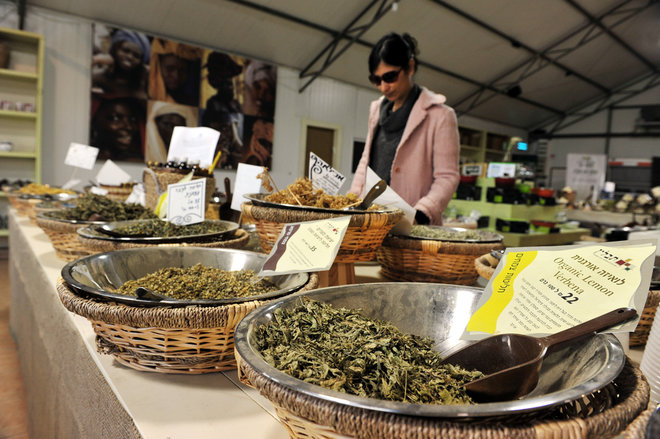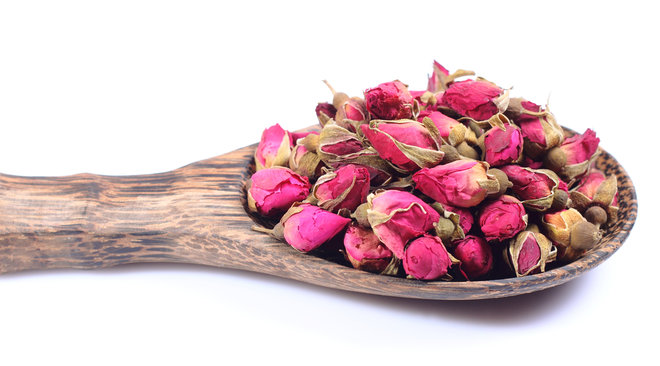“Middle Eastern food” is a catch-phrase that embraces the cuisines of so many countries, and ethnic streams inside those countries, that a list of 60 essential ingredients can’t cover everything. But if you love the flavors of the Middle East… be it cumin-scented, crunchy falafel or the fragrance of rose-water in pastries like ma’amoul, it’s worth organizing space in your kitchen for the ingredients listed below.
You probably already have many of the suggested items in this post. We have also posted recipes for some exotic things, like pomegranate molasses, that you can make yourself. Some items, like sheep’s tail fat, are available only in Middle Eastern butcher shops and supermarkets. Olive oil or smen (clarified butter) are fine substitutes for sheep’s tail fat.
In most cases, you can omit or substitute ingredients. Some are unique, though, like the unmistakable taste of saffron. Much as we appreciate turmeric and indeed often cook with it, it will never smell or taste the same as saffron. For the cook experienced with Middle Eastern fare, this post may look like a shopping list, useful for reminding which items to replace. For those eager to learn more about cooking Middle Easter delicacies at home, it’s a good start.
To bring out spices’ best flavors, buy them whole, in small quantities, and grind them yourself. A traditional mortar and pestle takes little space in the kitchen and does the job quickly.
Allspice berries
Anise seeds
Bay leaves
Black pepper
Cardamom, both ground and whole seeds
Chilies, dried
Cinnamon, both ground and in sticks
Cloves, both ground and whole
Coriander seed, both ground and whole (for grinding fresh)
Cumin
Fennel seeds
Fenugreek seeds
Ginger, ground, or fresh root in season (can be frozen)
Mint, dried
Nigella seeds (black cumin)
Nutmeg
Rose petals, dried
Saffron
Sesame seeds
Sumac, whole berries or powdered (Rhus syriaca)
Turmeric, ground or fresh root in season (can be frozen)
Za’atar leaves, dried
Place your leafy green herbs in a jar of water where they can get some indirect light, and they will keep for at least a week. Some, like mint and basil, might actually grow roots. Those, you can transplant to dirt and put outside to snip bits off whenever you need some.
Basil
Chives
Coriander leaves (cilantro)
Fenugreek
Garlic
Ginger root (may be frozen, whole)
Hot peppers of all sizes and varieties and degrees of heat
Mint
Onions
Parsley
Rosemary
Scallions
Thyme and lemon thyme
Turmeric root (may be frozen, whole)
Za’atar
If you’re not familiar with an ingredient – say, dried limes – buy only a little at first, then find a recipe using it. Once you’re comfortable with the ingredient, decide if you want to invest in a little more.
Anba, pickled mango relish (to dribble on falafel, shwarma and grilled anything)
Date honey (silan) – try our sweet potatoes roasted in date honey, here.
Honey, local
Lemon juice
Lemons and limes, dried
Orange-blossom water
Pomegranate molasses
Rosewater
Tahini paste to dilute and season
Tamarind paste or syrup
Fats
Olive oil
Smen (clarified butter, recipe here)
Sheep’s tail fat
Some items listed below, like walnuts and raisins, are not exclusively Middle Eastern, but are there because every Middle Eastern cook has some on hand, all the time.
Almonds, whole or blanched
Beans, navy and fava (broad beans), dried or canned
Burgul (cracked wheat), medium ground
Chickpeas, dried or canned
Couscous, instant
Dates
Lentils (see our delicious majadra, lentil and rice recipe here)
Pine nuts
Raisins, black and golden
Rice, long-grained Persian or Basmati varieties
Semolina
Walnuts
Photos of Tel Aviv spice display, mixed spices, dried rose petals, fresh za’atar herb, lemons, olive oil and lentils via Shutterstock







